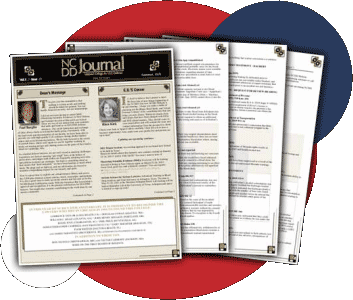- The ABA’s Concise Guide to Lawyer Specialty Certification
- Benefits to Become Board Certified - ABA Video
- Board Certified Members
- How to Become Board Certified in DUI Defense Law
- Apply for Certification
- Apply for Re-Certification Renewal
- Board Certified Senior Specialist
- Rules Governing Board Certification
- Preparing for the Exam
The NCDD Amicus Committee
Posted on December 01, 2022 in Uncategorized

By NCDD
The National College for DUI Defense (NCDD) Amicus and Research Committee was formally created in 2002. The NCDD Amicus and Research Committee files amicus briefs as ‘friends of the court' in important appellate cases that involve the rights and privileges of persons accused of impaired driving offenses nationwide. Many of the nation's top impaired driving attorneys volunteer their time and efforts to author amicus briefs that are filed with the Supreme Court of the United States or before a state's supreme court in the United States. Often, the entire membership, which is over 1000 attorneys, have an opportunity to contribute to the final NCDD amici brief.
The NCDD has filed numerous amicus briefs concerning legal issues that are referenced by a state's appellate courts or the Supreme Court of the United States (SCOTUS). The NCDD appeared as amici for the first time before SCOTUS in the case of Illinois v. Lidster, 540 U.S. 419 (2004), which involved whether observational roadblocks violated the Fourth Amendment. The NCDD amicus brief was prepared by NCDD members Barry T. Simons and W. Troy McKinney and the legal issue in the case was argued before SCOTUS by NCDD member Donald Ramsell.
The issue of whether a chemical testing measurement created by a breath testing machine was admissible in a DUI case, where the accused did not have the opportunity to cross examine the person responsible for validating the accuracy and reliability of the chemical measurement, was raised by NCDD members Leonard Stamm and W. Troy McKinney in the case of Napier v. Indiana, 546 U.S. 1215 (2009), where SCOTUS denied the request for a writ of certiorari.
The issue of whether it violated confrontation to deny a person accused of a DUI charge the right to cross examine the nurse, who drew the blood samples, and the laboratory technician, who was responsible for creating the chemical testing measurement in the DUI case was argued by NCDD members Leonard Stamm and W. Troy McKinney in their amicus brief in support of certiorari in the SCOTUS case of O'Maley V. New Hampshire, 557 U.S. 934 (2009), where SCOTUS denied the request for a writ of certiorari. Before filing this brief, NCDD asked the National Association of Criminal Defense Lawyers (NACDL) to join the brief. NACDL declined but offered to let Stamm and NCDD sign on to their brief in the next case, as that case had a greater chance of cert being granted.
NCDD and Leonard Stamm signed on to the amicus brief filed by NACDL in Melendez-Diaz v. Massachusetts, 557 U.S. 305 (2009), which argued that a laboratory report concerning a final chemical testing measurement was testimonial and required the right to confront the laboratory analyst responsible for creating the chemical testing measurement that would be used against the accused in a criminal proceeding. The decision was a win for the defense.The confrontation issue would come up again before SCOTUS in the context of whether a person has a right to face to face confrontation of the person responsible for creating a chemical testing measurement in a DUI case in Bullcoming v. New Mexico, 564 U.S. 647 (2011), which was filed jointly with NACDL and authored by NCDD members Leonard Stamm, Ronald L. Moore, and Justin J. McShane as well as members of NACDL.
This case was also a win for our side and our brief was cited in ftnt. 1 of the Court's opinion, that drew significantly on the information our brief provided. Leonard Stamm jointly prepared another amicus brief for the NCDD with NACDL in the SCOTUS case of Missouri v. McNeely, 569 U.S. 141 (2013), which rejected Missouri's argument that the evisceration of alcohol in the blood stream creates a “per se” exigency that allows warrantless blood testing in all DUI cases under a state's implied consent law.
The issue of warrantless chemical testing under implied consent laws would come up again with SCOTUS in Birchfield v. North Dakota, 579 U.S. 438, 474 (2016), where NCDD members Donald Ramsell and Leonard Stamm again joined with NACDL and argued that the legal fiction of implied consent prevented the warrantless production of biological samples for chemical testing in a DUI case under implied consent. The Court held that blood tests will usually require a warrant, while breath tests are permitted as a search incident to an arrest.
Use of the legal fiction of implied consent to obtain the warrantless production of blood samples for chemical testing would come up again in the SCOTUS case of Mitchell v. Wisconsin, 139 S. Ct. 2525, 204 L.Ed.2d 1040 (2019), where NCDD members Donald Ramsell, Michelle Behan, Flem Whited, and Andrew Mishlove argued that the legal fiction of implied consent should not apply to an unconscious driver, where warrants are readily available. In Mitchell, the SCOTUS concluded that exigent circumstances do exist in most cases involving unconscious drivers.
Finally, in Arthur Gregory Lange v. State of California, 594 U.S. ___, 141 S.Ct. 2011, 210 L.Ed.2d (2021), NCDD members Donald Ramsell, Flem Whited, and Bell Island argued to SCOTUS that pursuit of a fleeing misdemeanant does not create exigent circumstances justifying a warrantless entry into the home. SCOTUS agreed that in most cases this is correct.
The NCDD has also filed numerous amicus briefs before a state's appellate courts. In 2005, NCDD members Edward L. Fiandach, Terence McCarty, Leonard R. Stamm, and John T. Kirk appeared as amici in the case of Green v. DeMarco, 2005 NY Slip Op 25528, 11 Misc. 3d 451, 812 N.Y.S.2d 772 (Sup. Ct. 2005), which involved the issue whether a laboratory report created during the chemical testing process was testimonial and could not be admitted into evidence.
In Commonwealth v. Yohe, 621 Pa. 527, 79 A.3d 520 (Pa. 2013), NCDD member Leonard Stamm argued that the constitutional right of confrontation was violated, when a “surrogate witness” was allowed to explain the chemical testing process at issue in that case.
In Maryland Motor Vehicle Administration v. Deering, 438 Md. 611, 92 A.3d 495 (2014), NCDD member Leonard Stamm argued that the failure to allow a licensee to speak with counsel prior to taking a chemical test under implied consent should violated due process and required the suppression of the alleged refusal to submit to chemical testing and associated implied consent suspension.
In City of Cincinnatti v. Ilg, 141 Ohio St.3d 22, 21 N.E.3d 278 (Ohio 2014) NCDD member D. Timothy Huey agued that Ohio's “per se” DUI charge did not create a conclusive presumption of guilt in a DUI case, which allowed the accused to obtain discovery concerning his final breath testing measurement that was sufficient to explain, confront, and rebut the accuracy and reliability of the final breath testing measurement in a DUI case.
In State v. Washburn, 2015 ND 8, 861 N.W.2d 173 (N.D. 2015) NCDD members Donald Ramsell and Chad McCabe argued that the criminalization of a refusal to submit to warrantless chemical testing under implied consent violates the Fourth Amendment and North Dakota Constitution.
In State v. Yong Shik Won, 137 Haw. 330, 372 P.3d 1065 (Haw. 2015) NCDD member Donald Ramsell argued that the criminalization of a refusal to submit to warrantless chemical testing under legal fiction of implied consent violates the Fourth Amendment.
In State v. Whalen, 2015 Ark. App. 706, 478 S.W.3d 249. (Ark. 2015), NCDD members Brad Williams and Bell Island argued that DUI checkpoint at issue in that case was not reasonable under the Fourth Amendment.
In State v. Trahan, 886 N.W.2d 216 (Minn. 2016) NCDD members Bell Island and Barry Edwards argued that the “per se” criminalization of a refusal to submit to warrantless chemical testing under implied consent violates the Fourth Amendment.
In Arizona v. Valenzuela, 239 Ariz. 299, 371 P.3d 627 (Ariz. 2016), NCDD members Michelle Behan argued that deeming consent to warrantless chemical testing under implied consent is not knowing and voluntary consent and violates the Fourth Amendment.
In State v. Pester, 294 Neb. 995, 885 N.W.2d 713 (Neb. 2016), NCDD member Bell Island argued that the Fourth Amendment created a constitutional right to refuse to consent to warrantless chemical testing under the legal fiction of implied consent.
In Commonwealth v. Gerhardt, 477 Mass. 775, 81 N.E.3d 751 (Mass. 2017) NCDD members Michael Delsignore and Julie Gaudreau argued that the arresting officer was not qualified to claim a person was impaired by marijuana based upon the person's ability to perform standardized field sobriety maneuvers.
In Williams v. State, Fla. Supreme Court Docket No 15-1417 (Fla. 2017), NCDD member Tracey Wood argued that criminalization of a refusal to submit to warrantless chemical testing under implied consent violates the Fourth Amendment.
In Commonwealth v. LaRose, 483 Mass. 323, 137 N.E.3d 360 (Mass. 2019) NCDD members Michael Delsignore and Julie Gaudreau argued that the evidence failed to support a valid basis to detain the accused for failing to maintain a single lane of travel requiring suppression of evidence for the invalid detention.
In McGraw v. State, 289 So. 3d 836 (Fla. 2019) NCDD member Flem Whited argued that the deemed to have given consent provision of Florida's implied consent that applies to an unconscious driver violated the Fourth Amendment.
In State of New Jersey v. Michael Olenowski, 247 N.J. 242, 254 A.3d 587 (N.J. 2019), NCDD member Steven Hernandez argued that law enforcement lacks the expertise to determine whether a person is impaired by drugs based upon an officer's claim to be a Drug Recognition Evaluator (DRE) and requesting that such DRE evidence be suppressed. The New Jersey Supreme Court assigned a special master to make findings of fact and conclusions of law concerning the validity of DRE testimony to prove drug impairment.
In People of Michigan v. Alton Fontenot Jr., 333 Mich. App. 528, 963 N.W.2d 397 (Mich. App. 2020), NCDD member Michael Nichols argued that due process required the disclosure of evidence sufficient to prove breath testing methods are accurate and reliable and that accused has confrontation right to impeach a chemical testing measurement.
In Michael Dean Dupre v. State of Michigan, 335 Mich. App. 126, 966 N.W.2d 200 (Mich. App. 2020), NCDD member Michael Nichols argued that Michigan's medical marijuana law required the prosecution to prove actual impairment by marijuana to uphold a driving under the influence of drug conviction based upon marijuana consumption.
In Alexander Dejarnette v. State of Maryland, 478 Md. 148, 272 A.3d 376 (MD 2022), NCDD member Leonard Stamm argued that the record failed to prove compliance with the mandatory observation period that applied to breath testing, which should require the suppression of the breath testing measurements in that case.
Find an Attorney
Enter your city, state, or Zip code below to locate a qualified attorney who has demonstrated a commitment to defend those accused of DUI and related crimes.








